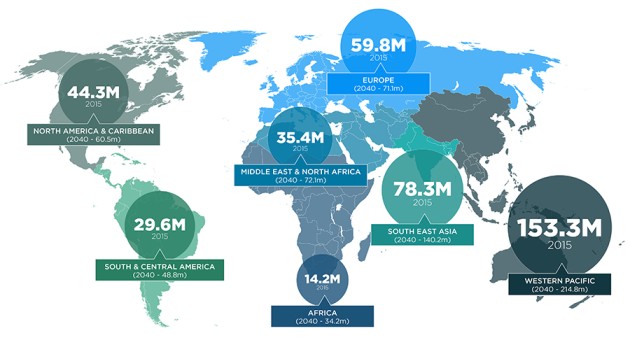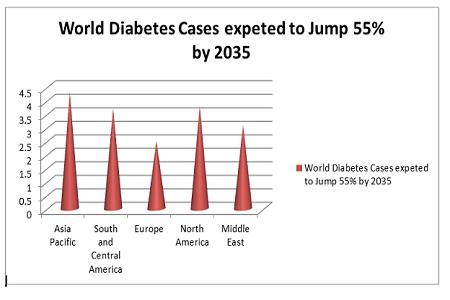Diabetes 2023
About Conference
Euroscicon is proud to host the "8th International Conference on Diabetes and Obesity" happening during October 16-17, 2023, in Vancouver, Canada. The conference is themed around “Evolutions in the field of Diabetes & Obesity Procedures and Treatment” with the aim to assemble a large audience of trade, healthcare, research, and medical practitioners to coach and produce a few fruitful discussions on the confined topics. This can be an excellent event to network, learn and have interaction with professionals within the field of polygenic disease and fat.
Benefits of Participation:
Diabetes 2023 is open for Oral papers, Poster shows and scientific panel discussions across the highlighted sessions within the web site and proposals on alternative topics that don't seem to be listed also are welcome provided, they meet the objectives of the conference. We are focusing to inspire, discuss, and work along to bring out an answer for numerous issues related to polygenic disorder and medicine.
Who can attend?
The DIABETES 2023 lays a platform for the Diabetologists, Endocrinologists and Experts both from Industry and Academia working in various subdomains of diabetes, endocrinology and metabolism. The Diabetes and Obesity conference is open for all the Diabetes Doctors, Specialists, Endocrinologists, Researchers, Physicians, Business Analysts, Academicians, Lab Technicians, Nurses, Diabetes Educators, Nutritionists and Dietitians.
Opportunities for Conference Attendees
Specialists & Educators:
- Speaker Presentations
- Poster Display
- Symposium hosting
- Workshop organizing
Students & Research Scholars:
- Poster Competition (Winner will get Best Poster Award)
- Young Researcher Forum (YRF Award to the best presenter)
- Student Attendee
- Group registrations
Business Delegates:
- Speaker Presentations
- Symposium hosting
- Book Launch event
- Networking opportunities
- Audience participation
Universities, Associations & Societies:
- Association Partnering
- Collaboration proposals
- Academic Partnering
- Group Participation
Companies:
- Exhibitor and Vendor booths
- Sponsorships opportunities
- Product launch
- Workshop organizing
- Scientific Partnering
- Marketing and Networking with clients
-

Diabetes 2023
Call for research abstracts are open for oral papers, poster presentations and scientific panel discussions across the highlighted sessions in the website and proposals on other topics that are not listed are also welcome provided, they meet the objectives of the conference. Our moto is to inspire, discuss, and work together to bring out a solution for various problems associated with diabetes and endocrinology.
- Best platform to develop new partnership & collaborations.
- Best location to speed up your route into every territory in the World.
- Most of our conference attendees are the Key contact in their labs purchasing decisions.
- Network development with both Academia and Business
- Professional learning experience.
Who can attend?
International Diabetes Conferences lays a platform for the Diabetologists, Endocrinologists and experts both from Industry and Academia working in various sub domains of diabetes, endocrinology and metabolism. The conference is open for all the professionals
- Diabetes professionals
- Endocrinology professionals
- Researchers
- Physicians
- Business Analysts
- Academicians
- Lab technicians
- Educators
- Primary care specialists
- Health care specialists
- Policy makers and direct service providers
Sessions/Tracks
Diabetes impacts how the body coordinates blood glucose levels. Insulin diminishes measurements of blood glucose however glucagon's job is to grow blood glucose levels. In people without diabetes, insulin and glucagon collaborate to keep blood glucose levels balanced. In diabetes, the body either doesn't make enough insulin or doesn't respond authentically to insulin causing unevenness between the effects of insulin and glucagon. In type 1 diabetes, the body can't convey enough insulin therefore blood glucose ends up being excessively high aside from if insulin is implanted.
In type 2 diabetes, the body is unfit to respond feasibly to insulin, which can in like manner bring about higher than conventional blood glucose levels. Medications for type 2 diabetes consolidate those which help to assemble insulin affectability, those which empower the pancreas to release more insulin and various remedies which prevent the appearance of glucagon.
Diabetes happens when the glucose, or sugar, in the blood is insufficiently controlled and dependably high. Type 1 happens when the body doesn't make enough of the hormone that empowers cells to hold and use glucose. This hormone is called insulin. While an individual can deflect type 2 by avoiding a sugar-rich eating normal and torpid lifestyle, staying away from type 1 is past the domain of creative mind. The safe system attacks gatherings of cells in the pancreas that would consistently make insulin, called islets, stopping or subsiding insulin age. Without enough insulin, glucose can't enter the cells and remains in the flow framework. A person with sort 1 diabetes should take insulin for a stunning leftover portion. Not doing in that capacity can bring about normally extending glucose levels and hazardous complexities. Type 1 Diabetes can occur at any age, despite the way that it is dynamically fundamental in adolescents and energetic adults.
Diabetes is an issue with your body that causes blood glucose (sugar) levels to rise higher than run of the mill. This is furthermore called hyperglycemia. Type 2 diabetes is the most outstanding sort of diabetes.
If you have type 2 diabetes your body doesn't use insulin really. This is called insulin opposition. From the start, your pancreas makes extra insulin to make up for it. Regardless, after some time it can't keep up and can't make enough insulin to keep your blood glucose at run of the mill measurements.
Diabetic retinopathy is the most broadly perceived purpose behind vision disaster among people with diabetes and a primary wellspring of visual disability among working-age adults. DME is an aftereffect of diabetic retinopathy that causes expanding in the region of the retina called the macula. Diabetic retinopathy is realized by mischief to the veins in the tissue at the rear of the eye (retina). Inadequately controlled glucose is a peril factor. Early signs fuse floaters, haziness, diminish zones of vision and issue seeing shades. Visual disability can occur. Smooth cases may be treated with mindful diabetes the administrators. Impelled cases may require laser treatment or medicinal strategy.
Diabetic neuropathy is a kind of nerve hurt that can occur if you have diabetes. High (glucose) can hurt nerves all through your body. Diabetic neuropathy much of the time hurts nerves in your legs and feet. Dependent upon the affected nerves, reactions of diabetic neuropathy can go from anguish and deadness in your legs and feet to issues with your stomach related structure, urinary tract, veins and heart. A couple of individuals have smooth symptoms. However, for others, diabetic neuropathy can be exceptionally anguishing and weakening. Diabetic neuropathy is an ordinary and veritable multifaceted nature of diabetes. Be that as it may, you can as often as possible keep away from diabetic neuropathy or moderate its empowering with tight glucose control and a sound lifestyle.
There are four fundamental kinds of diabetic neuropathy they are peripheral neuropathy, autonomic neuropathy, radiculoplexus neuropathy and mononeuropathy
Diabetic nephropathy (diabetic kidney disease) is kidney hurt that results from having diabetes. Having high blood glucose levels on account of diabetes can hurt the bit of the kidneys that channels your blood. The hurt channel pushes toward turning out to be 'broke' and gives protein access to your pee. For specific people, diabetic nephropathy can progress to kidney frustration. Regardless, a considerable number of individuals with diabetes don't make kidney disorder that advances to kidney disillusionment.
Diabetic nephropathy usually has no signs at a perfect time. You can't tell that there is protein in your pee – it's something that is perceived with a pee test.
It can take various years for the kidney harm to progress. Symptoms commonly conceivably show up when kidney hurt has disintegrated basically.
- weight loss;
- a poor appetite or feeling sick;
- swollen ankles and feet (due to retaining fluid);
- puffiness around the eyes;
- dry, itchy skin;
- muscle cramps;
- needing to pass urine more often;
- feeling tired; and
- having difficulty concentrating
Pathophysiology of Endocrine Glands and Hormones
The endocrine system is a progression of organs that produce and emit hormones that the body utilizes for a wide scope of capacities. These control a wide range of substantial capacities, including:
- Respiration
- Metabolism
- Reproduction
- Sensory perception
- Movement
- Sexual development
- Growth
- Hormones are conveyed by organs and sent into the course framework to the various tissues in the body. They send signs to those tissues to uncover to them what they ought to do. Exactly when the organs don't convey the fitting proportion of hormones, sicknesses develop that can impact various pieces of life.
- A part of the components that impact endocrine organs fuse developing, certain diseases and conditions, stress, nature, and inherited characteristics.
Metabolic and Bariatric Surgeries
Metabolic issue is the name for a gathering of hazard factors that raise your hazard for coronary disease and other therapeutic issues, for instance, diabetes and stroke. The articulation "metabolic" implies the biochemical strategies connected with the body's run of the mill working. Hazard factors are properties, conditions, or inclinations that extension your shot of working up a disease.
Different "metabolic" ailments and conditions are connected with genuine or dismal bulkiness including Type 2 Diabetes, hypertension, raised cholesterol, non-alcoholic oily liver disease, and obstructive rest apnea. The gastrointestinal (GI) tract and little entrail accept essential occupations in the rule of glucose levels, fat processing, and in the control of longing for and body weight. Metabolic issue can in like manner coronary illness (CHD), a condition wherein a waxy substance called plaque (plak) creates inside the coronary conductors. Plaque sets and confines the stockpile courses, reducing circulation system to your heart muscle. This can incite chest torment, coronary failure, heart harm, or even passing.
Metabolic bariatric medical procedure method can essentially improve or fix diabetes in some powerful patients including a social occasion that doesn't cautiously meet the criteria of grim chunkiness. Metabolic medicinal system can institutionalize blood glucose levels and mull over a finish of insulin treatment. Re-establishing diabetes through metabolic therapeutic system has been a stunning and welcome improvement for an ailment that has irrefutably been seen as consistent and irreversible.
Obesity is an erratic issue including an absurd proportion of muscle to fat proportion. Obesity isn't just a helpful concern. It extends your risk of diseases and therapeutic issues, for instance, coronary sickness, diabetes and hypertension. Being incredibly strong techniques you are especially inclined to have medicinal issues related to your weight. Luckily in any event, unassuming weight decrease can improve or keep the therapeutic issues related with chubbiness. Dietary changes, extended physical development and lead changes can empower you to shed pounds. Doctor suggested medications and weight decrease restorative technique are additional decisions for treating huskiness.
Obesity is examined when your weight list (BMI) is 30 or higher. Your weight record is controlled by disconnecting your weight in kilograms (kg) by your stature in meters (m) squared. For most by far, BMI gives a reasonable measure of muscle to fat proportion. Regardless, BMI doesn't clearly evaluate muscle versus fat, so a couple of individuals, for instance, solid contenders, may have a BMI in the weighty grouping notwithstanding the way that they don't have bounty muscle to fat proportion. Ask with respect to whether your BMI is an issue.
Clinical research and Case studies
A clinical preliminary is a way to deal with unequivocally test another prescription or device in patients before it is embraced by the FDA to be used in broad daylight. Clinical preliminaries are a significant and basic advance in our having the ability to have new meds for diabetes and other shifted conditions. A contextual analysis is an approach and a procedure that explores a marvel with its genuine setting. Contextual analyses and clinical preliminaries are utilized to create or evaluate the nature of the drugs being created.
Diabetic Nutrition & Physical Fitness
A diabetic eating regimen just strategies eating the most gainful sustenance's in moderate aggregates and holding fast to standard eating times. A diabetes diet is a decent counting calories game plan that is ordinarily rich in enhancements and low in fat and calories. Key parts are characteristic items, vegetables and whole grains. Without a doubt, a diabetes diet is the best eating game plan for the most part everyone.
A diabetes diet relies upon eating three dinners for each day at standard events. This causes you better use the insulin that your body makes or moves beyond a drug. An enlisted dietician can empower you to gather an eating routine reliant on your prosperity goals, tastes and lifestyle.
Diabetes mellitus is a heterogeneous social event of dissipates depicted by industrious hyperglycemia. The two most fundamental sorts of diabetes are type 1 diabetes (T1D, as of late known as insulin-subordinate diabetes or IDDM) and type 2 diabetes (T2D, as of known as non-insulin-subordinate diabetes or NIDDM). Both are realized by a blend of genetic and characteristic peril factors. Regardless, there are other remarkable kinds of diabetes that are really gained. These fuse maturity onset diabetes in the young (MODY), and diabetes on account of changes in mitochondrial DNA.
A wide range of diabetes impacts affects prosperity. Despite the results of surprising absorption of glucose (e.g., hyperlipidaemia, glycosylation of proteins, etc.), there are different long stretch perplexities related with the disease. These consolidate cardiovascular, periphery vascular, visual, neurologic and renal varieties from the standard, which are accountable for dreariness, inadequacy and abrupt going in energetic adults. In addition, the infection is connected with regenerative challenges causing issues for the two mothers and their children. But improved glycemic control may reduce the risk of working up these burdens; diabetes stays a critical purpose behind social, mental and budgetary loads in peoples far and wide.
Cell transplantation in Diabetes
Islets are cells found in bundle all through the pancreas. One of these is beta cells, which make insulin. Insulin is a hormone that empowers the body to use glucose for essentialness. Islet cell transplantation trades cells from an organ provider into the collection of another person. It is a test treatment for sort 1 diabetes.
In type 1 diabetes, the beta cells of the pancreas never again make insulin. A person who has type 1 Diabetes must take insulin consistently to live. Transplanted islet cells, nevertheless, can expect power over made by the crushed cells. The beta cells in these islets will begin to make and release insulin. Experts trust islet transplantation will assist people with sort 1 diabetes live without step by step insulin infusions.
Reproductive Endocrinology and Infertility
Reproductive Endocrinology and Infertility (REI) is a cautious subspecialty of obstetrics and gynecology that trains specialists in regenerative solution keeping an eye on hormonal working as per multiplication similarly as the issue of desolateness. While most REI aces basically base on the treatment of Infertility, conceptive endocrinologists are set up to similarly evaluate and treat hormonal dysfunctions in females and folks outside fruitlessness. Regenerative endocrinologists have distinguishing strength getting ready in obstetrics and gynecology (ob-gyn) before they experience sub-specialty planning (participation) in REI.
Prediabetes suggests that your glucose level is higher than common anyway not yet adequately high to be type 2 diabetes. Without lifestyle changes, people with prediabetes are in all regards inclined to progress to type 2 diabetes. In case you have prediabetes, the long stretch damage of diabetes — especially to your heart, veins and kidneys — may starting at now be starting. Prediabetes impacts adults and adolescents. A comparative lifestyle changes that can help foresee development to diabetes in adults may in like manner help take adolescents' glucose levels back to normal.
Diabetes manifestations fluctuate contingent upon how much your glucose is raised. A few people, particularly those with prediabetes or type 2 diabetes, may not encounter indications at first. In sort 1 diabetes, manifestations will in general please rapidly and be increasingly serious.
A portion of the signs and side effects of sort 1 and type 2 diabetes are:
- Increased thirst
- Frequent urination
- Extreme hunger
- Unexplained weight loss
- Presence of ketones in the urine (ketones are a byproduct of the breakdown of muscle and fat that happens when there's not enough available insulin)
- Fatigue
- Irritability
- Blurred vision
- Slow-healing sores
- Frequent infections, such as gums or skin infections and vaginal infections
Type 1 diabetes can create at any age; however it regularly shows up amid youth or immaturity. Type 2 diabetes is the more typical sort, can create at any age; however it's more typical in individuals more seasoned than 40.
Public Health challenges of Diabetes
Public Health ensures and advances the soundness of the individuals where they live. General wellbeing experts mean to counteract individuals living in networks from becoming sick and make mindfulness among them to energize sound air. Inoculating kids to dodge spread of ailment, instructing them as far as hazard components and preventive measures, creating nourishing projects and so on are done by individuals in general wellbeing offices. They likewise shed light on why not many networks of individuals are more inclined to an ailment than others.
Gestational diabetes just happens in the midst of pregnancy. It suggests you have high glucose levels, anyway those measurements were common before you were pregnant. If you have it, you can at present have a sound baby with help from your master and by doing direct things to manage your glucose, also called blood glucose. After your new-born child is imagined, gestational diabetes when in doubt leaves. Gestational diabetes makes you bound to make type 2 diabetes, anyway it won't happen.
Diabetic Macular Edema (DME) is a social occasion of fluid in the macula—some part of the retina that controls our most distinct vision limits—due to spilling veins. In order to make DME, you ought to at first have diabetic retinopathy. Diabetic retinopathy is a disease that damages the veins in the retina, realizing vision obstruction. Left untreated, these veins begin to create weight in the eye and discharge fluid, causing DME. DME generally takes on two structures
- Focal DME, which happens in light of variations from the norm in the veins in the eye.
- Diffuse DME, which happens due to augmenting/swelling retinal vessels (extremely meager veins).
Diabetic Retinopathy and DME are regular issues for diabetics. Generally 8% of the U.S. populace is diabetic, and about 28% of those diabetics have eye inconvenience as a result of it. Frequently, DME is related with:
- those who have had diabetes for an extended amount of time,
- serious hypertension (high blood pressure),
- fluid retention,
- hypoalbuminemia (low levels of protein in body fluids),
- and hyperlipidemia (high levels of fats in the blood)
Thyroid issue are conditions that impact the thyroid organ, a butterfly-formed organ in the front of the neck. The thyroid has basic occupations to oversee different metabolic methodology all through the body. Different sorts of thyroid issue impact either its structure or limit.
The thyroid organ is arranged underneath the Adam's apple collapsed over the trachea (windpipe). A slight zone of tissue in the organs inside, known as the Isthmus joins the two thyroid folds on each side. The thyroid uses iodine to convey vital hormones. Thyroxin, generally called T4, is the basic hormone made by the organ. After transport by methods for the circulatory framework to the body's tissues, a little piece of the T4 released from the organ is changed over to triiodothyronine (T3), which is the most unique hormone.
The limit of the thyroid organ is constrained by an info segment including the cerebrum. Right when thyroid hormone levels are low, the operational hub in the mind conveys a hormone known as thyrotropin releasing hormone (TRH) that causes the pituitary organ (arranged at the base of the cerebrum) to release thyroid stimulaating hormone (TSH). TSH animates the thyroid organ to release more T4.
Since the thyroid organ is obliged by the pituitary organ and operational hub, issue of these tissues can similarly impact thyroid limit and cause thyroid issues.
Nanotechnology for diabetes treatment
Nanotechnology is extending hugeness in diabetics' investigation in the continuous decade. It is a field that incorporates nanomaterials, nanostructures, nanoparticle structure and their applications in individuals, etc. It in like manner gives dynamically exact information to diagnosing diabetes mellitus. Nanotechnology has overhauled sedate transport to those zones which were unfavorable for macromolecules. It is advancing new implantable identifying headways as such giving exact helpful information. The blend of nanotechnology and drug has made another field "nanomedicine" to improve human social protection. A segment of the employments of nanotechnology in treating diabetes mellitus are phony pancreas, as opposed to pancreas transplantation use of fake beta cells, for oral transport of insulin use of nanospheres as biodegradable polymeric bearers, etc. In this assessment, usages of nanotechnology in treating diabetes mellitus are discussed.
The endocrine framework is a game plan of organs that pass on and discharge hormones that help control different basic body limits, including the body's capacity to change calories into centrality that forces cells and organs. The endocrine framework impacts how your heart throbs, how your bones and tissues grow, even your capacity to make an infant kid. It expect an imperative part in paying little notice to whether you make diabetes, thyroid malady, progression issue, sexual brokenness, and a huge social event of other hormone-related disperses.
The hormonal system (called the endocrine structure in medical terminology) has various organs that release differing hormones. It's the way by which one bit of the body (the organ) tells another bit of the body (the goal cell) to achieve something indispensable. The endocrine organs sway multiplication, absorption, improvement and various limits.
Coming up next is a summary of the rule organs (see diagram for their zone), a part of the hormones they produce and what impacts they have on the body.
- Hypothalamus
- Pituitary gland
- Pineal gland
- Thyroid gland
- Parathyroid gland
- Adrenal glands
- Pancreas
- Ovaries (females only)
- Testes (males only)
Endocrine cancers growths are those found in tissues of the endocrine framework, which incorporates the thyroid, adrenal, pancreas, parathyroid, and pituitary organs.
Pediatric endocrinology (British: Pediatric) is a remedial subspecialty overseeing disarranges of the endocrine organs, for instance, assortments of physical advancement and sexual improvement in youth, diabetes and some more.
By age, pediatric endocrinologists, dependent upon the age extent of the patients they treat, care for patients from most punctual stages to late pre-adulthood and energetic adulthood.
The most broadly perceived illness of the forte is type 1 diabetes, which generally speaking speaks to at any rate half of an ordinary clinical practice. The accompanying most normal issue is advancement issue, especially those genial to improvement hormone treatment. Pediatric endocrinologists are commonly the fundamental specialists related with the remedial thought of children and adolescents with intersex issue. The strength in like manner oversees hypoglycemia and various kinds of hyperglycemia in youth, assortments of pubescence, additionally other adrenal, thyroid, and pituitary issues. Various pediatric endocrinologists have interests and fitness in bone digestion, lipid digestion, pre-adult gynecology, or intrinsic mistakes of digestion.
Market Research
There are approximately more than 130 million diabetic patients in the United States, according to current studies, making it the third-largest country in the world in terms of diabetes sufferers. Diabetes is a significant cause to renal disease, heart attacks, strokes, blindness, and lower limb amputation. The rising obesity rates brought on by the ageing population are the main causes of these frequent instances of diabetes. An estimated 2 million people died in 2019 from diabetes-related renal damage. According to statistics, more than half of Americans are either fat or overweight, primarily as a result of sedentary lifestyles, physical inactivity, and bad eating patterns. Furthermore, the ageing population in the United States of America has been increasing since the 1960s. Individuals aged 65 and over accounted for around 11 September of the total population in 1960, but in 2020, this cohort accounted for approximately 15 August 1945 of the total U.S.A. population. The diabetes care devices market is made up of sales of diabetes care devices and related services made by businesses (organizations, single proprietorships, and partnerships) that manufacture diabetes care devices used to monitor and regulate blood glucose levels in diabetic patients. Driven by rising polygenic disorder incidences and thus the undeniable fact that the U.S.A. has one of the best per capita tending expenditures, the U.S.A. market for polygenic disorder medication has grown at a CAGR of around 11.8% between 2011 and 2020, reaching a price of US$ 45.4 Billion in 2020.
Diabetes is rapidly becoming a lifestyle illness, afflicting both young and old people. As the number of Patients increases throughout the world, there has never been a greater and more urgent need for breakthrough treatment strategies in clinical and preclinical testing that can halt the disease's progression. The diabetes market, which mostly consists of Type 1 and Type 2 diabetes, is vast and rapidly expanding. The global diabetes market is estimated to increase at an 8% CAGR from 2020 to 2024. The market is divided into three sections: type of diabetes, medicine class, and diabetic equipment. Diabetes medications have the largest market share among pharmaceuticals and devices and are predicted to increase at the fastest rate, with a CAGR of 8.9%. Lantus (Sanofi), Januvia (Merck and Co), Humalog (Eli Lily And Co), Novo rapid (Novo Nordisk), Levemir (Novo Nordisk),Victoza (Novo Nordisk),Janumet (Merck And Co), Novo log (Novo Nordisk), Humalin (Eli Lily And Co), and Galvus are some of the best-selling diabetes medicines (Novartis). With the diabetes population estimated to exceed 350 million by 2030, the industry is expected to rise at a rapid pace. One of the primary disadvantages of diabetic medicines is their high cost.
Overview of the Market
The European Diabetes Drugs Market is expected to grow at a CAGR of more than 3% during the projected period.
The pandemic of COVID-19 has had a significant influence on the European Diabetes Drugs Market. People with diabetes have a weakened immune system, which is exacerbated by COVID-19. Diabetes patients are more likely than non-diabetics to have significant problems. Diabetic medicine makers took care during COVID-19 to ensure that pharmaceuticals were delivered to diabetes patients with the assistance of local governments. "Since the start of COVID-19, our commitment to patients, our employees, and the communities where we operate has remained unchanged," Novo Nordisk stated on their website. "We continue to supply our medicines and devices to people living with diabetes and other serious chronic diseases, safeguard the health of our employees, and take actions to support doctors and nurses as they work to defeat COVID-19."
Diabetic pharmaceuticals are medications designed to stabilize and manage blood glucose levels in diabetics. Diabetic medications have been proposed as prospective treatments for diabetic people infected with SARS-CoV-2 during the COVID-19 epidemic. During the first wave of COVID-19 in Europe, the estimated cost per hospital admission ranged from EUR 25,018 for type 2 diabetes patients in good glycemic control to EUR 57,244 for type 1 diabetes patients in poor glycemic control, reflecting a higher risk of intensive care, ventilator support, and a longer hospital stay. For people without diabetes, the projected cost was EUR 16,993. The overall direct expenditures for COVID-19 secondary care in Europe are anticipated to be 13.9 billion euros. Diabetes care consequently accounted for 23.5% of total spending.
In recent years, the European area has seen an alarming increase in the prevalence of diabetes. Diabetes is linked to a slew of health issues. Patients with diabetes must make several adjustments during the day to maintain normal blood glucose levels, including as administering more insulin or consuming additional carbs while checking their blood glucose levels.
As a result of the aforementioned reasons, the studied market is expected to increase throughout the analysis period.

Diabetes medication research market in Europe is estimated to grow at a 5.08% CAGR between 2018 and 2026. It is the world's second-largest market for diabetic medications. Every year, around 3.4 million individuals die as a result of high blood glucose levels. Approximately 80% of these deaths occur in impoverished and emerging nations, and nearly half are adults under the age of 70. According to new WHO data, diabetes mortality would more than treble between 2005 and 2030. Diabetes affected 69.2 million persons (8.7%) in India in 2015. Type 2 diabetes affects around 90% of the patients. Diabetes Research Market is estimated to develop at a 6.5% CAGR between 2016 and 2023. The Diabetes Market in India is rapidly expanding. India is predicted to expand from US$ 4778.7 million in 2016 to US$ 7441.6 million by 2023. North America spent $263 billion, whereas Europe and Northern Asia spent $147 billion. China, Mongolia, South East Asia, and Oceania followed with a total of $88 billion.

Type 2 diabetes:
Type 2 diabetes (also known as non-insulin-dependent diabetes or adult-onset diabetes) is caused by the body's poor utilization of insulin. Type-2 diabetes affects more than 95% of diabetics. This kind of diabetes is caused mostly by high body weight and inactivity.
The symptoms are frequently less severe than those of type 1 diabetes. As a result, the condition may be discovered years later, when problems have developed.
Until recently, this kind of diabetes was exclusively found in adults, but it is gradually becoming more common in youngsters.
Diabetes type 1
Type 1 diabetes (formerly known as insulin-dependent, juvenile, or childhood-onset diabetes) is characterized by insufficient insulin production and need daily insulin delivery. There were 9 million persons with type 1 diabetes in 2017, with the majority of them living in high-income nations. Its cause and prevention methods are unknown.
Excessive urine excretion (polyuria), thirst (polydipsia), persistent hunger, weight loss, visual problems, and exhaustion are all symptoms. These symptoms may appear unexpectedly.
Diabetes during pregnancy
Gestational diabetes is defined as hyperglycemia, or blood glucose levels that are higher than normal but lower than those required diagnosing diabetes. Gestational diabetes is a kind of diabetes that develops during pregnancy.
Women who have gestational diabetes are more likely to have difficulties during pregnancy and delivery. These mothers, as well as their children, are at a greater risk of developing type-2 diabetes in the future.
Prenatal screening, rather than reported symptoms, is used to identify gestational diabetes.
Trends in the Market
Diabetes prevalence is rising.
During the predicted period, the European region's diabetes population is expected to increase by more than 15%.
According to the IDF, the total diabetes spending in Europe among those aged 20 to 79 years is USD 156 billion, with that figure predicted to rise to USD 174 billion by 2040. According to these estimates, diabetes accounts for around 9% of overall healthcare spending in Europe.
In recent years, the European area has seen an alarming increase in the prevalence of diabetes. Patients with diabetes must make several adjustments during the day to maintain minimal blood glucose levels, including as taking anti-diabetic medication or eating more carbs while monitoring their blood glucose levels. Obesity, a poor diet, and physical inactivity are all contributing to a rise in newly diagnosed Type 1 and Type 2 diabetes cases. The fast growing incidence and prevalence of diabetes patients, as well as healthcare spending, are indicators of increased diabetic medicine use.
Oral anti-diabetic drugs have been accessible globally and are indicated for usage when escalation of type 2 diabetes treatment is necessary, in addition to lifestyle control. Diabetes patients may need to take anti-diabetic medications for the rest of their life in order to manage their blood glucose levels and avoid hypoglycemia and hyperglycemia. For example, the National Service Framework (NSF) initiative improves services by establishing national standards to improve service quality and address disparities in treatment. The Association of British Health-Tech Industries (ABHI) established a diabetes section in 2019, allowing diabetes technology businesses to collaborate in the first forum of its type. These benefits have aided in the increased acceptance of these items in the United Kingdom market.
New Development
Oramed Pharmaceuticals revealed in March 2022 that ORMD-0801 (a novel molecule) is being examined in two pivotal Phase 3 studies and might be the first oral insulin capsule with the most convenient and safest method of delivering insulin treatment. The experiment also assessed ORMD-0801's efficacy in lowering liver fat content across a 12-week treatment period using a variety of independent measurements. These measures comprised MRI PDFF (%), Fibrosis and Steatosis as assessed by Fibro scan, Lipids, and HbA1c. All parameters revealed a constant clinically significant trend in favor of ORMD-0801. Oramed is also working on the development of an oral GLP-1 (Glucagon-like peptide-1) analogue capsule (ORMD-0901).
On 20 May 2021, the Committee for Medical Products for Human Use (CHMP) proposed a change to the terms of Novartis Euro pharm Limited's marketing authorization for the medicinal drug Jalra. The updated product qualities summary will include thorough instructions for utilizing this product (SmPC)
Societies Associated with Diabetes Research:
- SBDR - Society for Biomedical Diabetes Research
- Austrian Diabetes Association
- Flemish Diabetes Association
- Association of Juvenile Diabetes
- Canadian Diabetes Association
- Juvenile Diabetes Foundation of Chile
- German Diabetes Union
- Diabetic Society of Singapore
- Japan Diabetes Society
- Hong Kong Diabetes Federation
- The International Society of Gynecological Endocrinology
- Royal Society of Medicine Endocrinology and Diabetes Section
- International Society of Psych neuroendocrinology
- International Neuroendocrine Federation
- European Society of Endocrinology
- Clinical Endocrinology Trust
- Swiss Diabetes Society
- Spanish Diabetes Society
- Korean Diabetes Association
Diabetic Research Centers Worldwide:
- University of Michigan Albert Einstein-Mount Sinai Diabetes Center
- Boston Area
- Columbia University
- Indiana University
- Johns Hopkins University/University of Maryland
- Joslin Diabetes Center - Harvard Medical School
- Stanford University
- University of Alabama at Birmingham
- UCSD-UCLA
- UCSF
- University of Chicago
- University of Michigan
- University of Pennsylvania
- University of Washington
- Washington University
- Vanderbilt University
- Yale University
- Albert Einstein College of Medicine
- Emory University
- Kaiser Foundation Research Institute
- University of Chicago
- University of Colorado
- International Diabetes Federation, UAE
- Public Health Research Center, Abu Dhabi, UAE
- Imperial College London Diabetes Centre, UAE
- Global Diabetes Research Centre, India.
- Diabetes Research Center, PUMCH, China
- Center for Diabetes & Endocrinology, Japan
- Leicester Diabetes Centre, United Kingdom
- Garvan Institute of Medical Research, Australia
- Persatuan Diabetes Indonesia Research Centre
Diabetic Hospitals Across the world:
- Mayo Clinic – Rochester, MN
- Cleveland Clinic – Cleveland, OH
- Massachusetts General Hospital – Boston, MA
- Johns Hopkins Hospital – Baltimore, MD
- UCSF Medical Center – San Francisco, CA
- New York-Presbyterian University Hospital of Columbia and Cornell – New York, NY
- Yale-New Haven Hospital – New Haven, CT
- Northwestern Memorial Hospital – Chicago, IL
- UCLA Medical Center – Los Angeles, CA
- University of Washington Medical Center – Seattle, WA
- Hospitals of the University of Pennsylvania-Penn Presbyterian – Philadelphia, PA
- Brigham and Women’s Hospital – Boston, MA
- Florida Hospital Orlando – Orlando, FL
- Cedars-Sinai Medical Center – Los Angeles, CA
- Barnes-Jewish Hospital/Washington University – St. Louis, MO
- Beaumont Hospital – Grosse Pointe, MI
- Mount Sinai Hospital – New York, NY
- Froedtert Hospital and the Medical College of Wisconsin – Milwaukee, WI
- Lancaster General Hospital – Lancaster, PA
- University of Kansas Hospital – Kansas City, KS
- KEM Hospital, Pune
- Lakeshore Hospital & Research Center, Kochi
- All India Institute of Medical Sciences (AIIMS), Delhi
- M.V. Hospital for Diabetes, Chennai
- St Vincent's Hospital Sydney
- The Australian Centre for Behavioral Research in Diabetes.
- Mahkota Diabetes Centre, Indonesia
- Newcastle Hospitals, UK
- Parkmore Medical Centre, South Africa
- Degla Diabetic Center, Egypt
- Diabetes & Metabolism Centre, Singapore
Visa Information
We always try to provide the best possible help to our attendees in order to obtain their visa.
A personalized invitation letter is provided to the registered attendees on request.
Mail us after your registration to obtain the personalized Invitation letter
Learn More
Top Diabetes and Endocrinology Universities Worldwide:
Michigan State University | Pennsylvania University | University of California | Diabetes conferences | University in Chicago | Health Sciences University | Type 1 diabetes conferences | Columbia University | Albany Medical College | Diabetes conferences 2019 USA | Columbia University New York Medical College | State University of New York | Diabetes mellitus conferences | University of Rochester | Weill Cornell Medical College | The Boston University | Nutrition conferences | Case Western Reserve University | University of Iowa | Texas Tech University System | University in Sacramento | Endocrinology conferences | The University of Nebraska | The University of Florida University of Minnesota | Diabetes conferences 2019 USA | Georgetown University | Brown University | The Rowan University | Diabetes mellitus conferences | East Carolina University | Pennsylvania University | The University of Alabama | Diabetes conferences Europe | Saint Louis University | The University of Colorado | The Ohio State University | Diabetes meeting 2019 | Nova Southeastern University | The University of Southern California | Metabolic syndrome conferences | Case Western Reserve University | The University of Alabama | The University of Colorado | Nova South-eastern University | Pediatric diabetes Columbia University | The University of North Carolina | Cornell University Stanford University | University in Sacramento | Diabetes congress | The University of Nebraska | The University of Florida | University of Minnesota | Brown University | Diabetes conferences | The Rowan University | The University of Nebraska | Georgetown University | Pennsylvania University | University of South Alabama | Type 1 diabetes conferences | University of Colorado | University in Los Angeles | Diabetes congress | Cornell University | Stanford University | University of the Pacific | Diabetes treatment conferences | The University of Washington | Emory University | The University of Pittsburgh | Vanderbilt University | Obesity conferences | University in New York City | The University of Texas | The University of Southern California | Louisiana State University | Harvard Medical School | Obesity conferences | University of Massachusett | Wayne State University | Western Michigan University | Washington University | Endocrinology conferences | Saint Louis University | University of Nevada | George Washington University | Florida International University | University of Miami Leonard | Type 2 diabetes conferences | Florida Atlantic University | University of Illinois | Loyola University Chicago | Northwestern University | Indiana University | Diabetes congress | University of Kansas | Johns Hopkins University |
Swansea University | Kings College London | Federal de Lausanne | University of Athens | University of Crete | University of Ioannina | Diabetes mellitus conferences | University of Patras | Endocrinology conferences | Medical University Pleven | Medical University of Plovdiv | Medical University of Sofia | Medical University of Varna | Sofia University | Obesity conferences | Trakia University of Stara Zagora | Medical University of Innsbruck | Karl Landsteiner University of Health Sciences | Johannes Kepler University Linz | Medical University of Graz | Medical University of Vienna | Paracelsus Medical University | University of Thessaloniki | University of Thessaly | University of Thrace | Diabetes meeting 2019 | Trinity College Dublin | University College Cork | University College Dublin | University of Limerick | Pediatric diabetes | University of Bologna | University of Catania | National University of Ireland, Galway | Royal College of Surgeons in Ireland | Diabetes conferences Europe | University of Ferrara | University of Modena and Reggio Emilia, Modena | University of Parma | University of Messina | University of Palermo | Diabetes congress | Albert Ludwig University of Freiburg | Ruprecht Karl University of Heidelberg | Heidelberg-Mannheim Eberhard Karl | University of Silesia | Wroclaw Medical University | Diabetes conferences | Bogomolets National Medical University | University of Zagreb | University of Cambridge | Type 1 diabetes conferences | University of Brighton | Plymouth University | University of Exeter | Type 2 diabetes conferences | Swansea University | University College London | University of Bristol | Diabetes treatment conferences | Ecole Polytechnique Federale de Lausanne | University of Edinburgh | Kings College London | Obesity conferences | University of Oxford | Swiss Federal Institute of Technology | University of Bristol | Nutrition conferences | Wroclaw Medical University | University of Zagreb | University of Sussex | Endocrinology conferences | Kings College London | University of Brighton | Plymouth University | Diabetes conferences 2019 USA | University of Oulu | University of Tampere | University of Turku |
Asia Pacific and Middle East Universities:
Armenian Medical Institute | Yerevan Haybusak University | Yerevan State Medical University | National University of Singapore | Peking University | Tsinghua University | Diabetes conferences | Nanyang Technological University | University of Hong Kong | Pohang University of Science and Technology | Seoul National University | Type 1 diabetes conferences | Chinese University of Hong Kong | University of Science and Technology of China | Fudan University | Hong Kong Polytechnic University | Zhejiang University, Korea University | University of Otago | Type 2 diabetes conferences | National Taiwan University | Nanjing University | University of Newcastle | Tohoku University | Charles Darwin University |


























